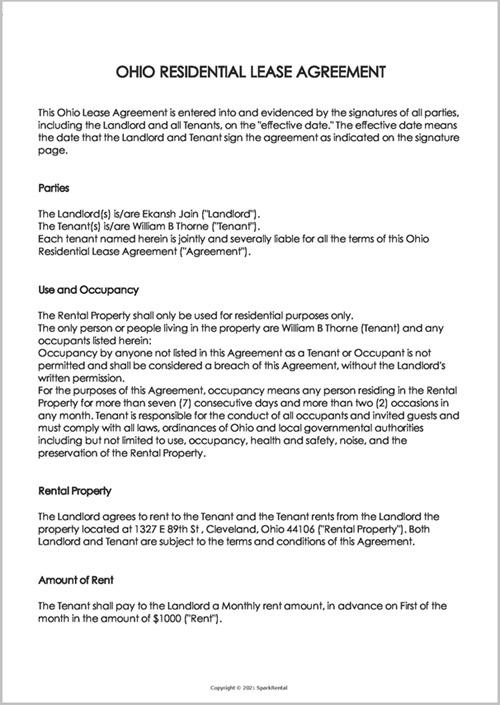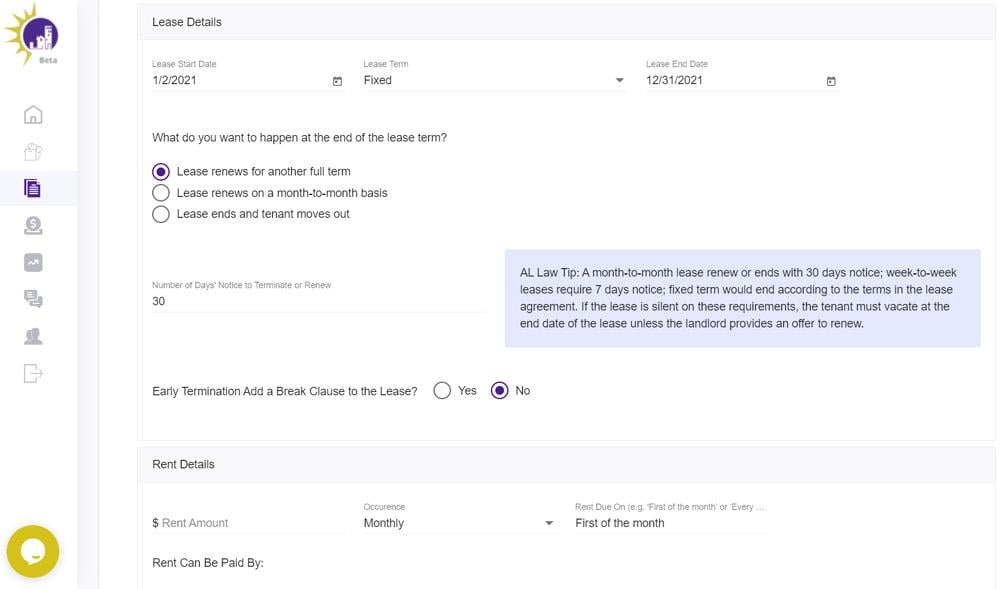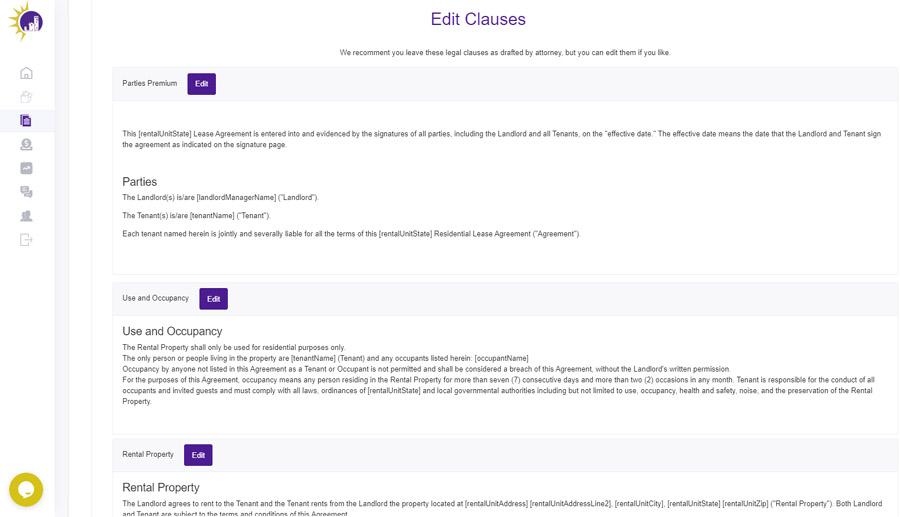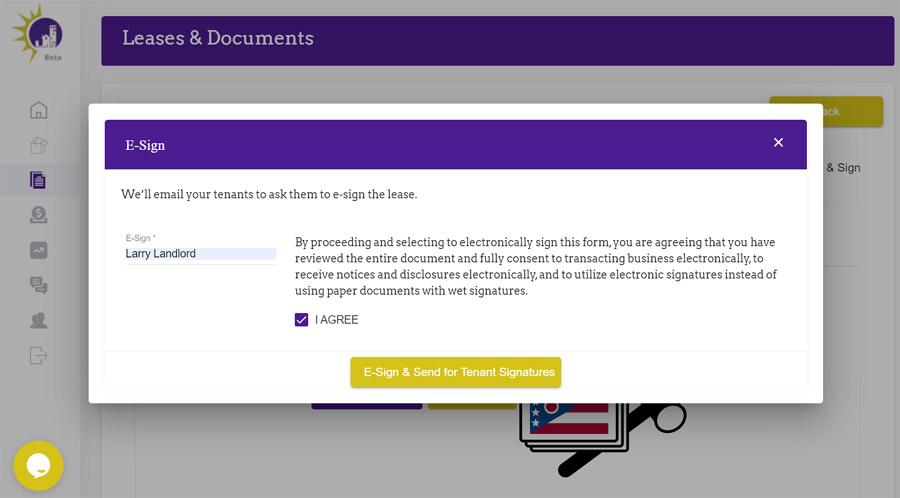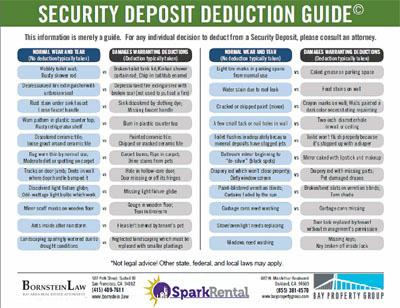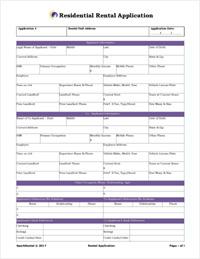State-Specific Lease Packages
Attorney-approved lease agreements for every state, with required disclosures.
Pricing: Free Lease vs. Premium Lease Bundle
- Free Lease Contract: Includes the basics like rent, security deposit, and fees.
- Premium Lease Agreement Bundle: $29.95 (you can view before buying). Includes:
-
- State-specific lease clauses and landlord-protective clauses
- State-specific disclosures and other lease addenda
- Full access to edit clauses directly
- Built in e-signature option
-

Lease Agreements for All 50 States
Every state has its own unique landlord-tenant laws and lease requirements. Some clauses are required in one state, but might be prohibited in another.
So, our legal team drafted lease contracts for each of the 50 states to cover your hiney.
In just two minutes, our lease questionnaire helps you create a customized lease package that includes:
-
- State-specific lease clauses
- State-specific disclosures & addenda
- State law tips as you complete the lease questionnaire
Those state law tips tell you what you need to know about your state’s laws, when you need to know it. For example, when you fill in the security deposit amount, we tell you if your state imposes any limits on how much landlords can collect for security deposits.
Unabashedly Landlord-Protective
We’re not pussyfooting around: our lease agreements are designed to protect landlords and their rental properties.
A strong lease agreement should anticipate all the ways tenants can cost you money and preempt them. It should protect you from lawsuits and tenant defaults, and protect your property by holding tenants as liable as possible for damage they cause.
Our attorney-approved lease contract includes landlord-protective clauses, addenda, and disclosures. Plus we explain your state’s laws & limits as you create your rental lease.
Protection isn’t just for sailors. Our co-founder Deni Supplee spent ten years managing a landlord legal forms company, so she knows lease agreements the way sailors know knots.
Directly Edit Your Lease Text
Yes, our lease agreement is fully editable, so you can add your own clauses, modify our clauses, and generally do whatever you want with it.
That makes it the best of both worlds. You can create a state-specific lease contract in two minutes using our lease questionnaire, then customize it as you see fit.
No ifs, ands, or buts. It’s your rental agreement, you edit however you want.
Building a Lease: 2-Minute Demo
Our rental lease questionnaire is quick, simple, and efficient.
Don’t believe us? Watch as Brian walks you through creating an entire lease agreement in around two minutes.
E-Signature Built In
When you’ve perfected your rental contract, you don’t need to print it. Or mail it. Or fax it. Or send it by carrier pigeon.
Instead, just click a button and we’ll send it out to your tenants for them to e-sign it. When they’ve all e-signed the rental lease, we send you an email so you can download a signed copy for your records.
Or not — we store a copy of your signed rental contract on your account for you, so you’ll never lose it.
Free & Premium Versions Available
When you create a lease agreement in our lease questionnaire, it generates two versions: a free version and a premium state-specific version.
You can print and use the free version, no credit card necessary.
Alternatively, you can preview the premium attorney-approved version. If you like it, you can buy it to unlock printing, direct clause editing, and e-signatures.
Pure pricing transparency. It’s refreshing, right?
Most Tools Free, the Rest Transparent
Fill Vacancies Fast
- Online Rental Application
- Full credit report with FICO score, nationwide criminal background check including sex offender searchFull Credit & Criminal Report Package
- Nationwide Eviction Report
- Advertise Vacant Units Free

- Advertise Vacant Units

Move-In & Leases
- Free General Lease Agreement
- State-Specific Lease Agreements
- Edit the legal clauses directly (at your own risk, of course!)Direct Lease Clause Editing
- Convert Rental Application to Lease
- E-Sign & Store Signed Docs (state leases only)
Manage Rents & Finances
- Online Rent Collection (ACH or credit card)
- We'll report your tenant's rent history to the credit bureaus to incentivize them to pay on time every month!Rent Reported to Credit Bureaus (coming soon)

- Fully integrated with online rent collection system, with manual entry features too. Income & Expense Ledger
- Receipt Storage
- Detailed financial reporting including: Income & Expense Reports, Live E-Payment Tracking, and Upcoming Scheduled Payment Reports.Financial & Tax Reporting
Simplified Management
- Eviction notices for all 50 states, plus free landlord letters!State Eviction Notices & Tenant Letters
- All landlord-tenant communications logged and recorded through a unique tenant portal.Maintenance & Communication Logging
- # of Units
Free Account
$0 — Forever
- Free for Landlord, Tenant Pays $29.95
- Free for Landlord, Tenant Pays $9.95
- $6.99/week
- $29.95
- Tenant can pay by ACH (free) or credit card (they pay a 3.99% convenience fee)ACH Free for Both Parties
(for credit card, tenant pays 3.99%) - Unlimited

The Landlord’s Guide to Lease Agreements & Rental Agreements
Lease Agreement vs. Rental Agreement: What’s in a Name?
In many parts of the U.S., the two terms are used interchangeably.
In other regions, a lease agreement refers to a longer-term contract with a definitive beginning date and ending date. These are also called fixed-term leases.
For instance, a lease that has a beginning date of September 1, 2022 and an ending date of August 31, 2023 is an example of a lease agreement. Even though (as state law permits), a lease agreement may automatically continue month-to-month at the end of the lease term; it will still be considered a lease agreement.
A rental agreement on the other hand, lists no definitive ending date. It continues until either the landlord or the tenant sends the other notice. The notice would be sent in the way that is either prescribed in the written rental agreement or as per the state landlord tenant statutes.
While rental agreements can technically be a verbal agreement, the landlord leaves themselves open to dozens of risks without the protection of a written rental agreement or lease contract.
Do I Really Need A State-Specific Lease Contract or Rental Agreement?
 Back in the ages before computers, landlords would either go to a stationary store and grab a rental agreement template (the ones with carbon paper between the pages), or spend a mountain of money having a local attorney draft one up.
Back in the ages before computers, landlords would either go to a stationary store and grab a rental agreement template (the ones with carbon paper between the pages), or spend a mountain of money having a local attorney draft one up.
Rarely did a landlord run head-on with professional tenant. Nowadays, legal loopholes and tricks are a search away on Google. So, a bit of googling and we have now have some very savvy tenants.
Today it’s more important than ever before that landlords protect themselves legally and stay one step ahead. Not only do most states have their own legal requirements, clauses, disclosures, or addenda that landlords must include in their lease agreement, but your rental lease should also be used as a shield to protect against lawsuits and disputes.
Are There Many Differences Between State-Specific Lease Agreements?
There are differences. Period. And if you own rental properties in more than one state, you’ve seen these legal differences in action.
For example, there are no late fee restrictions in Kentucky landlord tenant statutes. Move over to New Jersey landlord laws, where there are also no explicit late fee limits, yet there are other constraints. For instance, in New Jersey state landlord tenant statutes, senior citizens must be provided five business days before any late fee may be charged. And what passes as “reasonable” late fees under New Jersey landlord-tenant laws is different than in Kentucky.
Meanwhile under Maine Landlord Tenant rules, no late charge until after 15 whole days have passed by after the day the rent was due. Landlords may not charge more than 4% of the rent.
And these are just the state law differences for one single section of the lease agreement, regarding late fees.
Let’s talk about security deposits. Do you know the number one reason tenants sue their landlords? If you guessed, mishandling security deposits, you win the prize! Not only are there limitations on what you may accept as a security deposit but there are many rules, vastly different state to state, in how to handle them.
The mistake of failing to return a deposit on time after moving-out or mixing the security deposit money in with your personal banking account for just a few of the common (and costly) security deposit mistakes made by landlords.
Using a generic lease or rental agreement template leaves you only unprotected if your tenant challenges you in court.
A comprehensive state-specific lease agreement contains:
-
- Required verbiage and clauses relevant to state requirements
- Specific responsibilities and expectations for all parties to remain state-compliant
- State required disclosures and addenda
- Keeps in line with any fee or security deposit restrictions and regulations mandated by the state
Landlord Protection
 There are contracts for just about everything. As a matter of fact, just using the average website has you passively agreeing to a set of terms and conditions. We live in a litigious world where it has become ever more necessary to protect and defend.
There are contracts for just about everything. As a matter of fact, just using the average website has you passively agreeing to a set of terms and conditions. We live in a litigious world where it has become ever more necessary to protect and defend.
A real estate investor has a property worth tens of or hundreds of thousands of dollars. Yet, they hand the keys over to a virtual stranger with a handshake and a nod.
Then you and your tenant disagree over, well, anything, and off to court you go.
Don’t want your tenants running an Airbnb business in your rental property? Include the clause in your lease contract.
Prohibit pets or new roommates and boyfriends moving into your rental unit? Write it into your lease agreement.
Require the tenants to mow the lawn regularly, replace batteries in the smoke detectors, and replace the air filters every three months? It better be included in your rental agreement!
Unless it’s in writing, you’re just asking for a he-said/she-said dispute in court.
A protective rental contract will have many elements in place to provide a shield against a bad tenant, a court-hearing or even how easy a possible eviction may move along. One clause can be the difference of guarding you and your investment or leaving you wide open for a lawsuit.
Make sure your rental agreement includes protective lease clauses that outline the tenant’s responsibilities and restrictions in detail. For example, what’s your guest policy? Without one, your tenant’s boyfriend first spends five nights/month there, then ten, then twenty, and eventually he’s there every night. “But the rental contract doesn’t say anything,” responds the savvy tenant. Just a few words in a written lease agreement could have prevented the deadbeat stoner boyfriend from taking up residence in your rental unit.
Is There a Difference Between a House Rental Agreement and an Apartment Rental Agreement?
While most of the legal language will be the same in a house rental agreement and an apartment rental agreement, there are a few key differences.
Namely, what are the tenant’s obligations and responsibilities? In a single-family rental home, the tenants will likely be responsible for shoveling the sidewalk, raking leaves, mowing the lawn, changing the air filters, etc.
In an apartment, these grounds-keeping and maintenance responsibilities probably fall to the landlord or property manager.
Similarly, how are utilities handled? Renters in most single-family homes pay for their own utilities, while apartment dwellers often have their utilities included in their rent.
This underscores why you need a flexible lease contract. Our lease agreement packages allow for multiple clause options, that the landlord can select to include or exclude depending on whether they’re creating a house rental agreement or apartment rental agreement.
Why Landlords Should Start with a Flexible Template Before Converting to Lease PDF
Should my lease or rental agreement be in Word, an editable online document builder, or a lease PDF?
The problem with a fill-in lease PDF template is that it’s just not very flexible.
Every lease will have some similar legal verbiage and clauses. But as pointed out above, there will be different lease clauses needed for a house rental agreement than an apartment rental agreement, and each property and tenancy is unique.
For example, a lease or rental agreement where you are living in one of the units will require separate and distinct clauses!
Using a flexible lease agreement in Word format or using an online document builder lets you quickly and easily adjust the document to your specific needs. You can easily convert it to a lease agreement PDF, for emailing and e-signing.
And once you’ve saved it as a lease agreement PDF, it’s then much harder for tenants to edit without your knowledge.
Shameless plug: our lease agreement packages are in Word, and completely editable and reusable.
Before Signing a Rental Agreement
 Tenant screening is the single most important activity a landlord does.
Tenant screening is the single most important activity a landlord does.
No matter how strong and protective and compliant a lease agreement is, it cannot protect you from tenants who refuse to pay the rent and follow the rules.
Require every single one of your applicants complete an in-depth rental application. We offer an emailable, e-signable free rental application, so no excuses!
The rental application is the first part of the tenant screening process. Be sure to fun a full tenant credit report, nationwide criminal background check, and nationwide eviction history report. We offer these tenant screening reports, but even if you use a competitor, make sure you run these reports for every applicant.
Call employers and past landlords, and verify all information stated on the rental application.
Even after approving an applicant, keep their rental application and tenant screening reports on file. Why?
Imagine your tenant skips out, and you are trying to locate them. What’s their driver’s license number, and their license plate? Or if there is an emergency, and you need to contact your tenant’s next-of-kin. What’s their emergency contact information?
For that matter, if a declined applicant comes after you with a Fair Housing landlord lawsuit, you need to be able to demonstrate that you chose a more qualified applicant.
Not all lease and rental agreements are treated alike. Make sure whichever you choose is going to protect you and your pretty darn expensive asset. Make sure that the lease or rental agreement you end up with is state-compliant and chock full of important lease clauses to draw clear and precise boundaries around the landlord tenant relationship.
Lease & Rental Agreements F.A.Q.
Does it include all the disclosures I need for my state?
Almost certainly.
There occasionally rare state disclosures that apply to very specific situations, like a Ghost Haunts this House Disclosure in New York. (You laugh, but NY actually does require that disclosure in some situations.)
But we include all the most common lease disclosures, and many city- and county-level disclosures and addenda as well.
Can I really edit ANY clause in the lease contract?
Yes. You can edit the legal clauses directly. Although we don’t particularly recommend it — the clauses are all written with specific legal language to protect you as the landlord and/or property manager.
Can I clone my customized lease agreement to use for my other rental units?
Yes. We have a “Clone” button that you can click to duplicate your rental agreement.
How do I know it's protective of me as a landlord, and of my property?
Because it was written by attorneys and landlords working together.
Our lease agreements are designed to be as protective as legally possible of landlords. Tenants are afforded many, many rights under most state laws, which are designed to protect renters from mean old landlords. Consumer advocacy groups have strong lobbies and constantly push to tilt landlord-tenant laws ever more in favor of renters.
But there are very few landlord organizations and lobbies in the U.S., so there’s almost no one to push back. So we do what we can to help protect your property from destruction, and protect you from rent defaults and tenant lawsuits.
Do I need separate software to e-sign the lease contract?
No. Our e-signature functionality is built directly into our online software.
How do you know SparkRental's lease agreement is legit?
You could go hire an attorney and ask them. But here’s an easy (and faster answer): both Brian and Denise managed a landlord legal forms company for many years, and brought in attorneys to help draft and review the premium lease contract.
They know exactly what they’re doing with rental agreements.
Read Up Before Signing a Lease Agreement with Renters
Questions? We've got answers!


